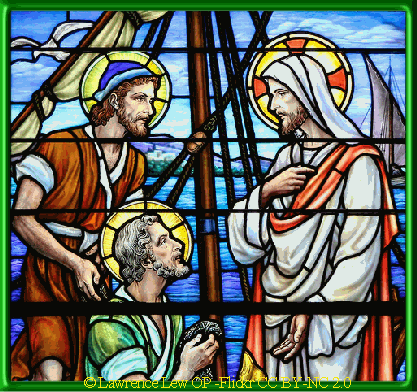6 February 2022
Isaiah 6: 1-2a, 3-8; 1 Corinthians 15: 1-11 Luke 5:1-11
Theme: Responding to God’s Call
A few months after his election to succeed Pope Benedict, Pope Francis gave a lengthy interview to the well-known Italian journalist, Antonio Spadero. The first question Antonio asked the new pope was: ‘Who is Jorge Mario Bergolio?’ Pausing for a few moments, Pope Francis replied: ‘I am a sinner. This is the most accurate definition; it is not a figure of speech, a literary genre. I am a sinner.’ The Pope paused again for a few seconds and then repeated his answer but with an important qualification: ‘I am a sinner whom the Lord has looked upon.’ This answer did not come from any false modesty on the part of Pope Francis but rather from a remarkable degree of self-awareness and honesty. We meet the same combination of self-awareness and honesty in the readings of today’s Eucharist.
Our first reading describes the call of the prophet Isaiah. Following an intense experience of God’s glory and majesty, Isaiah becomes acutely aware of his sinfulness and cries out: ‘What a wretched state I am in! I am lost, for I am a man of unclean lips and I live among a people of unclean lips, and my eyes have looked at the King, the Lord of Hosts’ (Is 6:5). Despite his sense of unworthiness, the Lord calls him to be his messenger, his prophet, after sending an angel to purify him with a live coal: “See now, this has touched you lips, your sin is taken away, your iniquity is purged.” “Then I heard the voice of the Lord saying: “Whom shall I send? Who will be my messenger?” (Is 6:7). Isaiah accepts the call and responds: “Here I am, send me” (Is 6:8).
Today’s gospel passage from Luke describes a similar acknowledgement of unworthiness, this time on the part of Simon Peter in the presence of Jesus. The context in which Peter becomes aware of being a sinner is significant. A professional fisherman, Peter and his companions had been fishing all night (the ideal time for fishing) and had caught nothing. When Jesus asks Peter to put out into deep water and lower the nets again, he must have been sceptical. Yet, he did as Jesus commanded and netted such a huge number of fish that the two boats were filled to sinking point. Seeing this epiphany of divine power, Luke tells us that Peter “‘fell at the knees of Jesus saying, “Leave me, Lord: I am a sinful man”’ (Lk 5:8). Not only does Jesus not leave him, but he reassures him and called him to discipleship and mission: ‘Do not be afraid; from now on it is people you will catch’ (Lk 5:10). The passage ends with Peter and his companions leaving their boats, nets and livelihood behind and following Jesus.
In today’s second reading, taken from his First Letter to the Corinthians, Paul reflects on his own calling to be an apostle. As a former persecutor of the Christians, he sees himself as unworthy to be called an apostle: ‘I am the least of the apostles; in fact, since I persecuted the Church of God, I hardly deserve the name apostle; but by God’s grace that is what I am’ (1 Cor 15: 9-10). Indeed, more than any of the apostles, Paul was aware that his vocation was a creative gift of God who does not judge by human standards or depend on human achievement. Addressing the Christian community of Corinth, he reminds them of this profound truth in these words: ‘Consider your call, brethren;… God chose what is foolish in the world to shame the wise, God chose what is weak in the world to shame the strong, God chose what is low and despised in the world, even things that are not, to bring to nothing things that are, so that no human being might boast in the presence of God’ (1 Cor 1:26-29).
Paul’s words were meant to encourage, not discourage the Christians of Corinth.
And they are meant to encourage us and to heighten our awareness of God’s grace at work in our lives. The examples of Isaiah, Peter and Paul invite all of us to reflect on our own calling as disciples of Jesus, to acknowledge how, in spite of being weak and sinful creatures, God’s grace continues to uplift and strengthen us. Perhaps, like Peter, it may have been an experience of failure that brought us to our knees and led us to more profound awareness of God’s grace. It was an experience of failure as a poet that brought the Monaghan poet, Patrick Kavanagh, to a deeper trust in the presence of the God who is manifested in nature and to a rediscovery of his poetic muse. In the depths of despair, he wrote these lines: ‘O God, can a man find you when he lies with his face downwards/And his nose in the rubble that was his achievement./Is the music playing behind the door of despair?/ O God give us purpose’. Yes, there was music playing behind the door of Kavanagh’s despair and it found expression in his wonderful poem, Canal Bank Walk:
‘Leafy-with-love banks and green waters of the canal,
Pouring redemption for me, that I do
The will of God, wallow in the habitual, the banal,
Grow with nature again as before I grew.’
So we pray: Heavenly Father, rekindle in our hearts the passion to continually answer your call. Like Isaiah, Peter and Paul, who gave themselves unselfishly in response to your call, may we too be generous in responding to the call to be your messengers and make a difference in our world.
Michael McCabe SMA, February 2022
To listen to an alternative Homily from Fr Tom Casey of the SMA Media Centre, Ndola, Zambia please click on the play button below.
|
|

